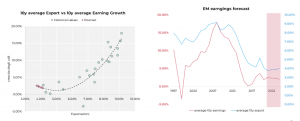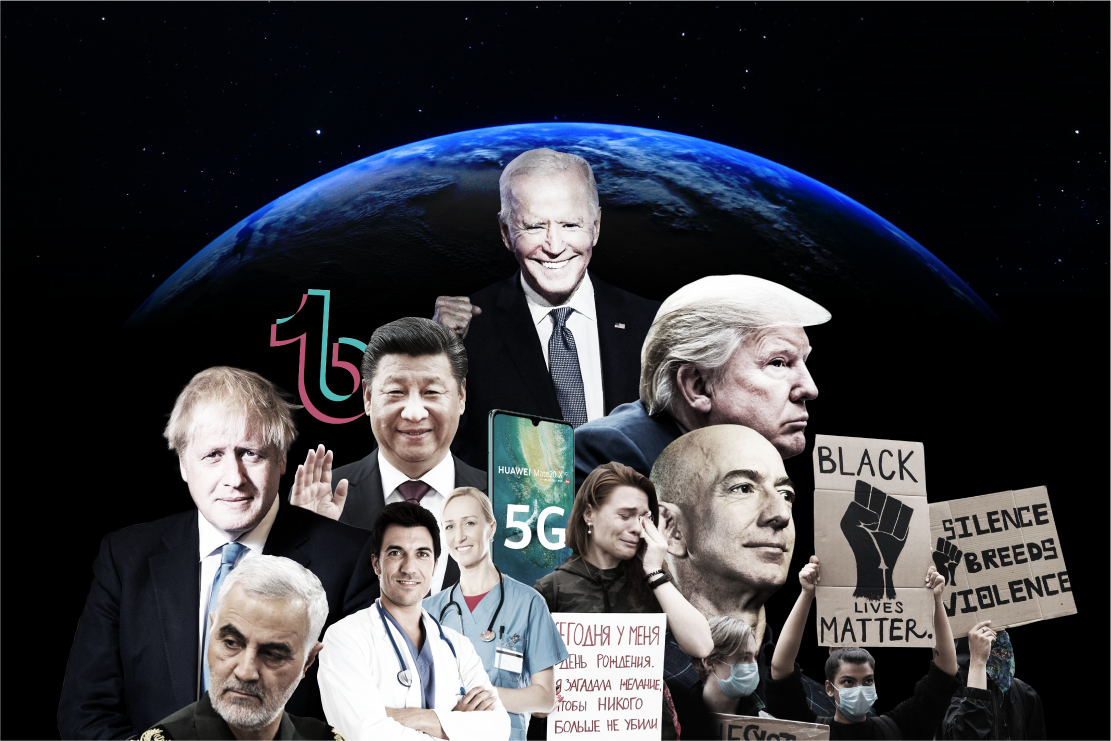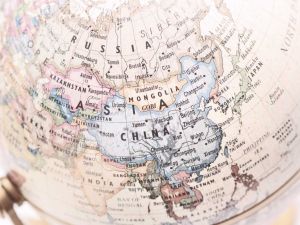In 2020, the world’s attention has been firmly focused on the pandemic. There have, though, been a number of important events across the year that are unrelated or only tangentially related to Covid-19. Each has had its own concrete, in some cases profound effect on financial markets.
2021 will mark the beginning of a new economic and financial cycle and, as usual, we will be alongside investors to guide them through the complexity, taking advantage of the many opportunities that will likely arise in the market. To get started with your own investment portfolio, follow the link below.
Get startedBiden wins the US election
It’s difficult to say exactly when Joe Biden won the 2020 US presidential election, such was the nature of the protracted counting and appeals process. Even so, the now-confirmed victory over Donald Trump has huge implications not only for the US and its markets but for the world at large.
The economic impact of Biden’s inauguration largely be felt in 2021, while the administration’s capacity to enact sweeping change lies in the critical Senate race runoffs in early January. Markets reacted well to the news of Biden’s victory, though, which is an early positive sign for the president-elect.
It’s likely we will see a significant fiscal stimulus package in an attempt to boost economic activity – though this was likely regardless of who won. There is also talk of some long-overdue spending on infrastructure. A Biden win also increases the likelihood of corporate tax rises and increased scrutiny on Big Tech in the US. Change is coming, only it will be a few months before that change properly takes shape.
Trade deal struck between Asian nations
In November, one of the most ambitious trade deals to date was signed by 15 nations of the Asia Pacific region. The deal became effective in an area of the world that is home to some 2.2 billion people, one-third of the world’s population.
The agreement covers trade, services, investment, e-commerce, telecommunications and copyright. The Regional Comprehensive Economic Partnership was signed by ASEAN (a comprehensive economic partnership that includes Vietnam, Thailand, the Philippines, Laos, Cambodia, Myanmar, Malaysia, Singapore, Indonesia and Brunei) along with Australia, China, Japan, New Zealand and South Korea.
The deal fills the political void left by the failure of TPP, the US-led trade initiative which was scrapped by President Trump. Most notably, India hasn’t signed the agreement yet, predominantly due to concerns around the agricultural policy.
What does this mean?
- Trade is becoming more and more multicentric. We know this, but trade isn’t dead just because Western countries are becoming a bit more conservative.
- Trade is not only about numbers; it is also a policy tool. China is extending its regional interest, creating preferential relations with nations that it considers to be rivals, like Australia.
From a financial point of view, it is obvious that many of the countries that are party to the agreement are territories that we, rightly or wrongly, part of the region that we define as Emerging Countries. The financial performance of this asset class has historically been correlated with the volume of trade and this agreement, by providing new trading opportunities, which may have a positive effect on the outlook for this asset class.

Trade tensions between the US and China
2020 has also been the setting for the escalating trade war between the US and China. Unsubtle at every turn, the seemingly endless back and forth of tougher tariffs and the race for tech dominance has been a key feature of the Trump administration.
Tensions were perhaps best demonstrated by the success of Tiktok in the US and the administration’s subsequent moves to ban it. US secretary of state Mike Pompeo told Fox News on July 7th that he was considering banning the platform in the US. By August 6th, Trump had issued an executive order to that end. He also, dramatically, declared Tiktok a “national emergency”.
The concern for administration was not over the content of the service, per se. The ostensible issue was the amount of data it allowed the Chinese government to gather about US users. The app, it transpired, had performed no excessive data mining – relative to its peers – and vowed to abandon some of its practices. It’s almost as if it never was about the data at all…
5G and Huawei
Since 5G mobile networks gained final approval in 2018, the industry’s leading operators have begun building their 5G networks nationwide. 5G promises significantly faster speeds, instant communication, and the ability to connect everything from autonomous vehicles to Internet of Things devices to the network.
The entire industry has mobilised to develop the next generation network, but 5G has not been without controversy. The US government fought to keep equipment manufactured by Chinese communications giant Huawei out of the nascent 5G networks in the US. These efforts included a plan for the government to work with companies such as Microsoft, Dell Technologies, and AT&T to develop 5G software that would provide an alternative to Huawei.
In recent years, Huawei has faced criticism from a handful of countries, most notably the US, who say the supplier’s equipment could be used by the Chinese government for espionage. Huawei has repeatedly dismissed the complaint.
In June, the FCC highlighted both Huawei and fellow Chinese telecom provider ZTE Technologies as national security risks. As a result, US cell phone makers can no longer spend federal dollars on equipment from either company.
Big tech under the spotlight
Tiktok and Huawei weren’t the only major tech companies under scrutiny in 2020. In a rare show of bipartisanship, the US justice department opened a complaint against Google and the rest of Big Tech after years of inaction.
In what experts expect to be just the start in an effort to rein in Big Tech, the antitrust lawsuit essentially challenged Google’s monopolistic practices, representing a major statement of intent about the US government’s approach to the industry. There are question marks about the scope of change that we can expect to see following the suit, with antitrust and ongoing regulatory oversight likely needed to curtail the growing power of Big Tech.
For investors, the move is something to keep an eye on. Big Tech stocks are unlikely to be dramatically affected any time soon, it seems, but any investors that heavily lean on them in their portfolios should be on top of developments in 2021.
A heightened focus on the environment
As the effects of climate change become increasingly evident around the world, initiatives to address the effects of pollution by businesses, consumers and governments multiplying.
The renewed attention on climate change will be a key topic in the coming years. It may have been overshadowed this year, but we believe that it will once again be front of mind for companies and consumers alike.
Meanwhile, 2020 was a year of novelties, with governments adopting stringent legislation to achieve the emission reduction targets included in the Paris Agreement. Government interventions to correct climate legislation has grown exponentially in recent years and 2020 made no exceptions with some striking cases.
In September, European leaders reached an agreement to increase the emission reduction target to 55%. The ball is now in Parliament’s court, which could lead to even stricter limits.
The UK has set an ambitious reduction target for 2030 – up to a 53% reduction from 1990 levels. The UK government has presented a 10-point plan which includes, among other things, a ban on the sale of petrol vehicles from 2030.
China, the world’s largest consumer of fossil fuels, surprisingly announced that it wanted to become Carbon neutral by 2060 and decrease its emissions as early as 2030. Meanwhile, the US, which had exited the Paris Agreement at the beginning of year, is expected to change direction with Biden making investment in energy transition part of his election program.
Evidently, these new rules will play a key role in determining long-term equity values and the green transition will become a core factor in determining the price of equity valuations. Investors and financial markets will likely support this transition, choosing companies with higher environmental standards for ethical and financial reasons.
Throughout 2020, we have seen a number of environmental disasters. They’ve ranged from the natural – the Australian wildfires and Cyclone Amphan in India and Bangladesh – to the humanmade – the disaster of the Ambarnaya River in Siberia and the disaster of the Mauritius Islands, where an oil tanker endangered an entire ecosystem.
Events such as these are a key difference-maker from the point of view of the financial markets. In 2021, our job as a wealth manager will be to keep up with this evolution of the markets and this new sensitivity. We will have to consider environmental impacts as a risk/opportunity in our assessments.
Black Lives Matter marches globally
In response to the death of George Floyd at the hands of the Minneapolis police department in May 2020, millions of people marched against police brutality, both in the US and elsewhere. Part of an ongoing political and social campaign, the protests were led by the Black Lives Matter movement, which came into existence publicly in 2013.
The protest marches were seen as a form of breaking point for racial tensions in the US, though the sentiment of the protests resonated globally – marches took place in a reported 2,000 cities across 60 countries.
The movement has had a significant legal and cultural impact. It has directly led to legislative proposals around police brutality and racial inequality in the US, while monument removals and name changes were common globally as an acknowledgement of the need for progressive action.
The protests, particularly taking place as they did during a global pandemic, were a reminder of the fragility of social order. When we discuss macro-trends going forward, we do so under the assumption that social order will be maintained despite the system being under stress for a number of social and economic reasons. The economic impact of major world events such as these is often indirect, but is something we will need to factor into our planning on a necessarily ad hoc basis.
A dramatic year for oil
2020 has been quite the year for oil. As Covid-19 – sorry, we couldn’t avoid mentioning it here – spread, oil prices began to slump before hitting rock bottom in April. WTI Crude futures contracts actually dropped below $0 for the first time in history with producers effectively paying to give it away.
This crash in prices was thanks, in part, to a steep drop in demand as a result of the pandemic. Lockdowns across the world meant that, simply, oil was far less necessary than it had been. If this wasn’t enough, we saw the Russia-Saudi Arabia oil price war, which was triggered in March 2020 and affected prices throughout the spring.
Since the nadir in April, oil prices have climbed following a sharp recovery in the second half of April and across May. Despite a slow uptick in the last couple of months, though, oil prices are still below pre-pandemic levels, with the second wave that hit large parts of the northern hemisphere causing them to stagnate somewhat.
2021 is likely to bring modest improvement in the price of crude oil, but it could be years before the scars left by the pandemic start to heal.
Goodbye Shinzo Abe
In September, Japan was rocked by the surprise resignation of Prime Minister Shinzo Abe, who left the position for health reasons after eight years as leader. Abe was the longest-serving prime minister of modern Japan and, despite controversies related to his management of power, he will go down as a key element of stability in Japanese politics.
When Abe came to power in 2012, Japan was in a turbulent situation – around 20 years of economic stagnation and a succession of six prime ministers in as many years. 2011, in particular, had been a particularly difficult year, with the disastrous earthquake that caused a tsunami and the nuclear disaster at the Fukushima power plant.
Abe made the revitalisation of Japan’s stagnant economy, which had entered a deflationary spiral worthy of business textbooks, his political mission. He went it about it through a partially successful program of structural reforms (the greater inclusion of women in politics was one of its main achievements) and, above all, by making extensive use of fiscal debt policy measures. In this sense, Abe was a precursor to the new course of world politics, which seems to be increasingly directed towards the use of financial leverage to stimulate growth.
Abenomics’ results were somewhat below expectations, but the prime minister still managed to reverse the deflationary spiral, bringing the country back to a moderate pace of growth. Abe’s period also coincided with an attempt to open Japan to the world, trying to exert the kind of soft power that has never been a hallmark of the country. The attempt, which should have culminated with the Olympics that were not held this summer, has borne fruit: the number of tourists visiting Japan has risen from 10 million in 2012 to 30 million in 2019.
Indian farmers protest en masse
One of the year’s less covered stories has been the quite remarkable farmers protest happening in India. In response to three farm acts passed in September 2020 by the Indian government, some 250 million people have been on strike across the country, making it the largest mass strike in history.
What’s clear is that Indian unions and opposition politicians view the reforms as “anti-farmer”, suggesting that the acts will hand over power unjustly to large corporations, at the expense of the farmers themselves – indeed, doubts around agricultural policy were largely the reason India failed to sign trade agreements with APAC nations.
What is less clear is how the widespread protest will affect one of the world’s largest emerging markets, particularly after positive performance within the context of the Covid-19 pandemic. Industry body CII has estimated that any ongoing agitation will have a knock-on effect on supply chains and could impinge on economic recovery.
Industrial action on this scale has seldom been seen anywhere in the world, with protests all but shutting down access to Delhi. A swift resolution to the protests may be in order if India is to make an effective recovery, though 250 million workers in the country may see the issue differently.
Discoveries and scientific advances
- NASA confirms the existence of molecular water on the sunny side of the Moon, near the Clavius crater, at concentrations up to 412 parts per million.
- Protein folding, one of biology’s greatest mysteries, has been solved by AlphaFold, an artificial intelligence algorithm developed by DeepMind.
- The Royal Astronomical Society announces the detection of phosphine in the atmosphere of Venus, a strong predictor of the presence of microbial life.
- The skeletons of 200 mammoths and 30 other animals were unearthed at a construction site for Mexico City’s Santa Lucía airport. It is the largest mammoth bone find to date.
- Africa is declared free of wild polio in a significant milestone. It’s the second virus to have been eradicated from the continent after smallpox 40 years ago.
2021 will mark the beginning of the new economic and financial cycle and, as usual, we will be alongside investors to help them through anything the year throws up while taking advantage of any opportunities that arise. If you want to find an investment portfolio that’s built around your goals, get started with our short online process.
Get started




